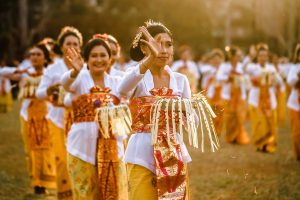Indonesia, a nation of over 17,000 islands, is more than just a tropical paradise known for its stunning beaches and vibrant cities. Beneath the surface of its modern advancements lies a profound cultural heritage that has been shaped by centuries of tradition, belief systems, and ancestral wisdom. Each region of the country holds onto its own distinct customs, some of which may appear mystical, dramatic, or even otherworldly to outsiders. These traditions are not merely relics of the past but living, breathing expressions of Indonesia’s identity—woven into the everyday lives of its people. While globalization has transformed many aspects of society, these traditions continue to endure, showcasing a deep connection between history, spirituality, and community.
From elaborate funeral rituals that treat death as a celebration of life, to sacred ceremonies that honor nature’s forces, Indonesia’s cultural landscape is filled with fascinating practices that challenge conventional perceptions of tradition. Whether influenced by animism, Hinduism, Islam, or indigenous belief systems, these customs serve as a testament to Indonesia’s resilience in preserving its unique identity. In a world that is rapidly homogenizing, Indonesia remains a beacon of cultural authenticity, where the past and present coexist in extraordinary ways. Here are 12 unique traditions from across the archipelago that will not only fascinate you but also offer a deeper understanding of the nation’s soul.
12 Unique Indonesian Traditions That Will Fascinate You

Indonesia, a vast archipelago with over 17,000 islands, is a melting pot of cultures, traditions, and customs. With more than 1,300 ethnic groups and a rich history shaped by various influences, the country is home to some of the most unique and fascinating traditions in the world. These traditions, deeply rooted in local beliefs and customs, are not only a testament to Indonesia’s cultural diversity but also serve as an integral part of the nation’s identity. From sacred ceremonies and elaborate festivals to distinctive ways of life, here are 12 unique Indonesian traditions that will captivate your curiosity and leave you in awe.
1. Torajan Funeral Rites – A Grand Send-Off for the Departed
In the highlands of South Sulawesi, the Toraja people practice one of the most elaborate funeral traditions in the world. For the Torajans, death is not an abrupt end but rather a gradual transition to the afterlife. When a family member passes away, their body is preserved for months or even years while the family saves money for an extravagant funeral. The funeral, known as Rambu Solo, involves traditional dances, buffalo sacrifices, and a massive gathering of relatives and guests. The deceased is then placed in a carved stone grave or a hanging cliff tomb, believed to bring them closer to the spirit world.
2. Nyepi – The Silent Day of Bali
Bali’s Nyepi or the Day of Silence is unlike any other New Year’s celebration in the world. Observed by the Balinese Hindus, Nyepi marks the start of the Saka New Year and is a day of complete silence, meditation, and self-reflection. For 24 hours, the island shuts down—no flights, no entertainment, and no activity on the streets. Even tourists are required to stay indoors. The night before Nyepi, however, is filled with vibrant processions featuring giant Ogoh-Ogoh (demonic effigies) that are paraded through the streets before being burned to cleanse the island of evil spirits.

3. Pasola – The Thrilling Spear-Throwing Festival
On the island of Sumba, an ancient war ritual called Pasola takes place every year. It is a dramatic jousting event where two groups of warriors on horseback throw wooden spears at each other. Pasola is not merely a sport but a sacred ritual tied to the local belief system. It is performed as a form of gratitude to the spirits for a bountiful harvest. The event draws thousands of spectators who gather to witness the thrilling and sometimes dangerous spectacle.
Also read: 7 Essential Items To Pack For A Bukit Lawang Jungle Trek
4. Ma’nene – The Ritual of Cleaning Corpses in Toraja
Another intriguing tradition from the Toraja people is Ma’nene, also known as the “Ceremony of Cleaning Corpses.” Every few years, families exhume the bodies of their deceased relatives, clean them, dress them in fresh clothes, and even take them on a walk around the village. This ritual is a way to honor their ancestors and maintain strong family ties, reinforcing the belief that death is not an end, but a continuation of existence.
5. Kasada Ceremony – Offering to the Gods in Mount Bromo
The Kasada Ceremony is an annual Hindu ritual performed by the Tenggerese people at Mount Bromo, East Java’s most famous volcano. The ceremony dates back centuries and involves villagers throwing offerings such as rice, vegetables, and even livestock into the crater of the active volcano. The ritual is performed to seek blessings and protection from the mountain gods. Interestingly, some brave villagers climb down into the crater to retrieve offerings, believing it brings good fortune.
6. Dugderan Festival – Semarang’s Ramadan Celebration
In Semarang, Central Java, the arrival of Ramadan is celebrated with a unique festival called Dugderan. The highlight of the festival is the Warak Ngendhog, a mythical creature resembling a mix of a dragon, goat, and bird. It symbolizes religious harmony and is paraded through the city. The festival also features lively cultural performances, fireworks, and traditional food stalls, making it a spectacular pre-Ramadan event.
7. Kebo-Keboan – The Human Buffalo Ritual
In Banyuwangi, East Java, the Kebo-Keboan ritual is held to ask for rain and agricultural prosperity. In this unique tradition, men dress up as buffaloes, cover themselves in mud, and plow the fields with wooden carts. They mimic the behavior of real buffaloes while villagers offer prayers and food. The ritual is believed to appease spirits and ensure a good harvest for the coming season.
8. Tabuik – The Grand Islamic Procession of West Sumatra
The Tabuik Festival in Pariaman, West Sumatra, is a grand Islamic procession commemorating the martyrdom of Husayn ibn Ali, the grandson of Prophet Muhammad. It involves the construction of giant Tabuik (coffin-like structures), which are paraded through the streets and eventually thrown into the sea. The festival, which includes traditional music, dance, and dramatic reenactments, attracts thousands of spectators.
9. Ngaben – The Balinese Cremation Ceremony
In Bali, Ngaben is the elaborate cremation ceremony for Hindus. It is not seen as a time of mourning but rather a joyful occasion, as it represents the soul’s journey to the afterlife. The body is placed in an ornately decorated sarcophagus and burned in a grand ritual. The ashes are then scattered into the sea or a sacred river. The ceremony is often accompanied by music, dances, and processions, making it one of the most spectacular funeral traditions in the world.
10. Fahombo – The Nias Tribe’s Stone Jumping Tradition
On Nias Island, young men undergo a rite of passage known as Fahombo or stone jumping. This tradition requires participants to leap over a 2-meter-high stone wall. It was originally practiced as a test of strength and agility for warriors, but today it remains a symbol of bravery and cultural pride. The impressive feat is often performed for tourists and during special ceremonies.
Also read: 10 Fascinating Facts About Jungle Ecosystems In Bukit Lawang
11. Seren Taun – The Sundanese Harvest Festival
The Seren Taun festival is an important Sundanese tradition in West Java, celebrating the rice harvest. It involves a series of rituals, music, and dance performances to express gratitude to the gods for a bountiful harvest. The highlight of the festival is the offering of newly harvested rice to the ancestral spirits, symbolizing prosperity and harmony with nature.
12. Reog Ponorogo – The Theatrical Dance of East Java
One of Indonesia’s most mesmerizing traditional performances is Reog Ponorogo, a dramatic dance originating from East Java. The performance features a massive, lion-like mask called Singo Barong, which can weigh up to 50 kilograms. Dancers carry the heavy mask using only their teeth, showcasing incredible strength and endurance. The dance tells ancient folk tales and is accompanied by hypnotic gamelan music.
Conclusion
Indonesia’s diverse traditions are a reflection of its rich cultural tapestry, each offering a unique glimpse into the beliefs, history, and way of life of its people. These customs, passed down through generations, continue to thrive in modern society, attracting curiosity and admiration from around the world. Whether you’re a traveler seeking authentic cultural experiences or someone fascinated by anthropology, Indonesia’s traditions will undoubtedly leave you inspired and amazed.

Alfath Dewantara is the manager of Jungle Inn Hotel in Bukit Lawang and a leading expert in Bukit Lawang eco-travel. With years of experience in sustainable tourism, he is dedicated to preserving the region’s rich biodiversity while providing authentic jungle experiences for visitors.




